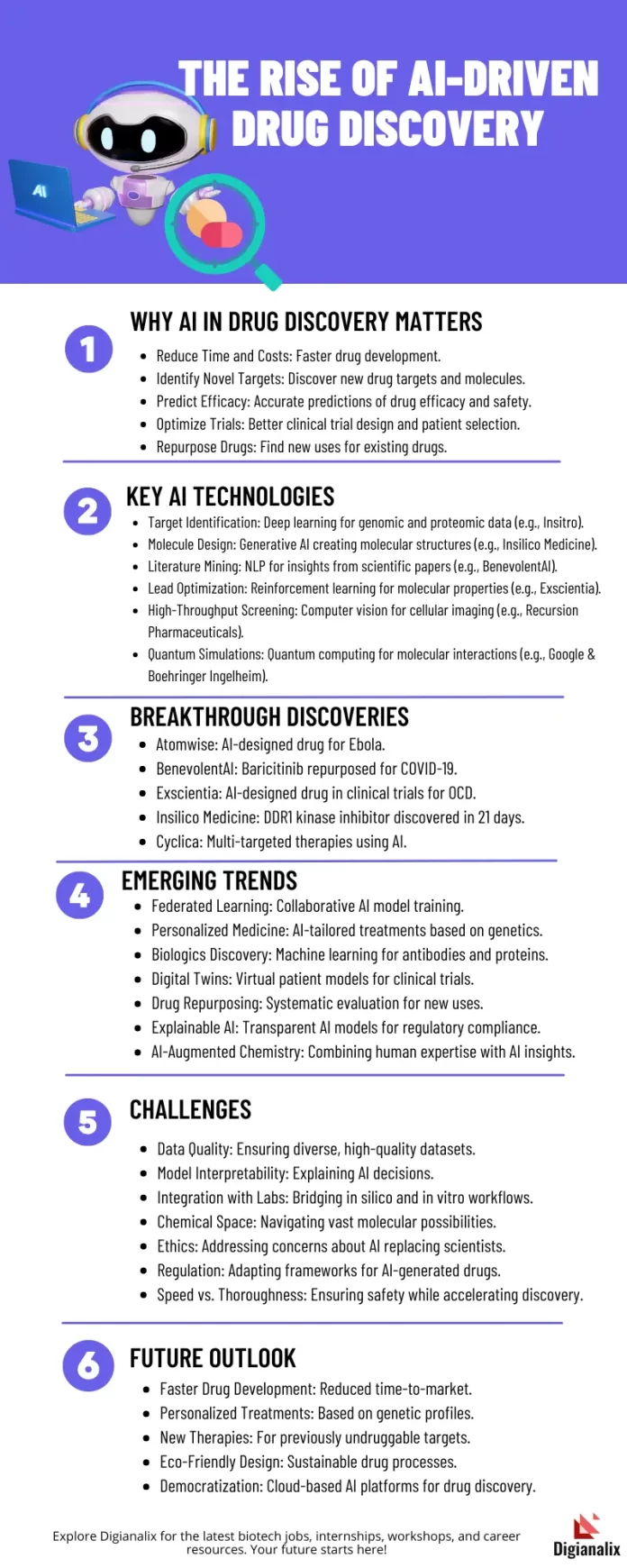Hey, biotech innovators and pharma enthusiasts! 👋 Ready to explore how artificial intelligence is reshaping the landscape of drug discovery? Let’s dive into the exciting world where algorithms meet molecules, accelerating the path from lab to life-saving treatments!
🚀 Why AI in Drug Discovery Matters AI-driven drug discovery is revolutionizing the pharmaceutical industry by:
- Dramatically reducing time and costs in drug development
- Identifying novel drug targets and molecules
- Predicting drug efficacy and safety with greater accuracy
- Optimizing clinical trial design and patient selection
- Repurposing existing drugs for new indications
Let’s unpack the groundbreaking developments of 2024!
🔬 Key AI Technologies in Drug Discovery
Machine Learning for Target Identification
Technique: Deep learning models analyzing genomic and proteomic data Example: Insitro’s platform combining machine learning with lab automation for target discovery
Generative AI for Molecule Design
Technique: Generative adversarial networks (GANs) creating novel molecular structures Example: Insilico Medicine’s GENTRL system for rapid drug candidate generation
Natural Language Processing for Literature Mining
Technique: NLP algorithms extracting insights from scientific papers and clinical reports Example: BenevolentAI’s knowledge graph for identifying hidden relationships in biomedical data
Reinforcement Learning for Lead Optimization
Technique: AI agents optimizing molecular properties through simulated interactions Example: Exscientia’s Centaur Chemist™ platform for iterative compound design
Computer Vision for High-Throughput Screening
Technique: Deep learning models analyzing cellular imaging data Example: Recursion Pharmaceuticals’ AI-powered phenomics platform
Quantum Computing for Molecular Simulations
Technique: Quantum algorithms simulating complex molecular interactions Example: Google and Boehringer Ingelheim’s partnership exploring quantum computing in pharma R&D
🌟 Breakthrough AI-Driven Drug Discoveries
- Atomwise: AI-designed drug candidate for Ebola virus
- BenevolentAI: Repurposed baricitinib for COVID-19 treatment
- Exscientia: First AI-designed drug to enter human clinical trials for OCD
- Insilico Medicine: Novel DDR1 kinase inhibitor discovered in 21 days
- Cyclica: AI-driven polypharmacology approach for multi-targeted therapies
💡 Emerging Trends in AI-Driven Drug Discovery
Federated Learning in Pharma
Focus: Collaborative AI model training without sharing sensitive data Potential: Enabling large-scale, privacy-preserving drug discovery collaborations
AI-Driven Personalized Medicine
Focus: Tailoring drug treatments based on individual genetic profiles Frontier: Precision therapies optimized for specific patient subgroups
AI in Biologics Discovery
Focus: Applying machine learning to antibody and protein therapeutics design Opportunity: Accelerating the development of complex biological drugs
Digital Twins in Drug Development
Focus: Creating virtual patient models for in silico clinical trials Application: Reducing the need for animal testing and optimizing human trials
AI-Enabled Drug Repurposing at Scale
Focus: Systematically evaluating existing drugs for new indications Potential: Faster, cost-effective drug development for unmet medical needs
Explainable AI for Regulatory Compliance
Focus: Developing transparent AI models for regulatory scrutiny Challenge: Balancing model complexity with interpretability
AI-Augmented Medicinal Chemistry
Focus: Empowering chemists with AI-driven insights and suggestions Opportunity: Combining human expertise with machine intelligence
🤝 Collaborations Driving Innovation
- Big Pharma-AI startup partnerships: e.g., GSK and Exscientia
- Tech giants entering pharma: e.g., Google’s DeepMind and Isomorphic Labs
- Academic-industry alliances: e.g., MIT’s Machine Learning for Pharmaceutical Discovery and Synthesis Consortium
- Cross-industry collaborations: e.g., MELLODDY project for privacy-preserving drug discovery
- Open-source initiatives: e.g., MoleculeNet for benchmarking AI in chemistry
🚦 Challenges in AI-Driven Drug Discovery
- Data quality and bias: Ensuring diverse, high-quality datasets for AI training
- Model interpretability: Explaining AI-driven decisions to regulators and clinicians
- Integration with wet lab workflows: Bridging the gap between in silico and in vitro
- Handling chemical space complexity: Navigating the vast landscape of possible molecules
- Ethical considerations: Addressing concerns about AI replacing human scientists
- Regulatory adaptation: Developing frameworks for AI-generated drug candidates
- Balancing speed and thoroughness: Ensuring safety while accelerating discovery
🔮 Future Outlook The future of AI in drug discovery is incredibly promising, with potential for:
- Drastically reduced time-to-market for new drugs
- Personalized treatments based on individual genetic and molecular profiles
- Novel therapies for previously “undruggable” targets
- Sustainable, eco-friendly drug design processes
- Democratization of drug discovery through cloud-based AI platforms
What AI applications in drug discovery excite you the most? Are you involved in AI-driven pharma research? Share your thoughts and experiences in the comments below!
Stay updated on the latest in AI-powered drug discovery by subscribing to our newsletter. Let’s usher in a new era of faster, smarter, and more personalized medicine together!




